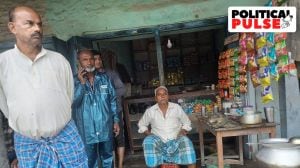Assam Police books Pakistan national linked to Elizabeth Gogoi: charges against Ali Tauqeer Sheikh
Ali Tauqeer Sheikh is a climate policy expert who has worked with Elizabeth Gogoi, the wife of Congress MP Gaurav Gogoi. What has he been booked for, and what happens next?
 Assam CM Himanta Biswa Sarma has aggressively gone after Elizabeth Gogoi on social media. (Express file pics)
Assam CM Himanta Biswa Sarma has aggressively gone after Elizabeth Gogoi on social media. (Express file pics) The Assam Police registered a case against Pakistan national and climate policy expert Ali Tauqeer Sheikh on Monday. The criminal case against Sheikh includes charges of ‘unlawful activities’ under the rigorous Unlawful Activities (Prevention) Act, 1967 (UAPA), and charges endangering the ‘sovereignty, unity and integrity’ of India under the Bharatiya Nyaya Sanhita, 2023 (BNS).
Sheikh previously worked with Elizabeth Gogoi, who is a British national and also works in climate policy. Elizabeth is married to Congress leader Gaurav Gogoi. The Assam BJP has alleged that she has ties with ISI, as she spent time in Pakistan while working with the Climate Development and Knowledge Network (CDKN), Asia, between 2011 and 2015. No charges have been brought against her so far.
The charges against Ali Tauqeer Sheikh
Section 13, UAPA: Sheikh has been accused under Section 13 of the UAPA, which punishes individuals or associations that take part in ‘unlawful activities’, whether the involvement is direct or otherwise. These activities have been given an expansive definition under the UAPA and include actions “which disclaims, questions, disrupts or is intended to disrupt the sovereignty and territorial integrity of India” or an action “which causes or is intended to cause disaffection against India”. Indulging in unlawful activities is punishable with up to seven years imprisonment and a fine.
The UAPA also gives more leeway to investigating agencies, allowing extended timeframes for completing an investigation and providing stringent bail conditions.
Section 152, BNS: Sheikh has also been accused under Sections 152 and 197 of the BNS. Section 152 has been understood as a replacement for the earlier offence of ‘sedition’ under Section 124A of the Indian Penal Code, 1860. Section 152 punishes those who “excites or attempts to excite, secession or armed rebellion or subversive activities, or encourages feelings of separatist activities or endangers sovereignty or unity and integrity of India”.
A Ministry of Home Affairs pamphlet on the difference between Sedition and the new offence it calls ‘Deshdroh’ explains that Section 152 is aimed at curbing offences against the nation, not just the government. It also states that “Criticism of the Government policies and actions are not punished under the new law”, which was one of the chief concerns regarding the earlier law on sedition, which led to the SC effectively staying it in 2022.
However, critics — including retired BSF Commandant Azad Singh Kataria, who has challenged the provision before the SC — have claimed that Section 152 poses the same threat of being misused to curb dissent as Section 124A.
Section 197, BNS: Sheikh has also been charged for making “Imputations, assertions prejudicial to national integration” under Section 197. This provision punishes those who:
- Claim that members of a particular racial, caste, linguistic or regional group shall be “denied, or deprived of their rights as citizens of India”;
- Claim that members of such a group cannot “bear true faith and allegiance to the Constitution of India;
- Make claims concerning a specific group which is “likely to cause disharmony or feelings of enmity or hatred or ill-will between such members and other persons”;
- Broadly “makes or publishes false or misleading information, jeopardising the sovereignty, unity and integrity or security of India”.
Sarma and other BJP leaders have highlighted Sheikh’s social media activity where he has criticised the Centre and the Assam government as a basis for the charges. Sarma stated “… a perusal of his social media activity includes exhaustive commentary on India’s internal affairs and parliamentary matters raising serious concerns on the said individual’s intention to compromise and damage India’s interests”.
Proceeding in a case against a foreign national
Sheikh is a Pakistani national who does not reside in India. While India has often signed extradition treaties with countries that allow foreign nationals to be tried on Indian soil if the alleged crime is punishable in both nations, there is no such agreement with Pakistan.
Even if Sheikh does not step on Indian soil, the investigation may proceed regardless and the Bharatiya Nyaya Suraksha Sanhita (BNSS) contains provisions to allow courts to proceed with the trial even if the accused is absconding.
For persons accused of serious offences which carry a punishment of ten years imprisonment, life imprisonment or death, Section 84 of the BNSS allows courts to declare them “proclaimed offenders”. Under Section 356, the court may conduct a trial “in absentia of proclaimed offender” (without the presence of a proclaimed offender).
However, certain conditions must be met first:
- Ninety days must have passed since charges were framed;
- Court must issue two consecutive warrants of arrest;
- A warning must be published in a newspaper that the trial will proceed in the accused’s absence unless she appears within 30 days;
- A family member of friend must be informed about the trial;
- Information about the trial commencing must be affixed “on some conspicuous part of the house…in which such person ordinarily resides”.



- 01
- 02
- 03
- 04
- 05



































